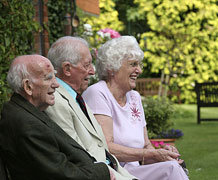Articles

A major study has launched aiming to help older people stay fitter and live independently for longer. Image courtesy of Bristol Health Partners.
Pioneering study to help adults delay frailty and live independently for longer
A major study, involving researchers from the University of Exeter, has launched aiming to help older people stay fitter and live independently for longer.
Project REACT (REtirement in ACTion) will target people aged over 65 years old who are starting to find everyday activities such as walking, climbing stairs and getting up from a chair difficult.
By engaging these people in a specially designed 12-month physical activity and social programme, REACT will test whether a decline in mobility and physical function can be slowed, stopped or even reversed.
From this month on, REACT starts recruiting almost 800 people over the age of 65 to take part in the new programme delivered in local community centres in Devon, Bath, Bristol, and Birmingham.
Dr Colin Greaves, REACT Principal Investigator from the University of Exeter Medical School, explained “What is exciting about REACT is that it is a real chance to boost the quality of life of people in their twilight years by actually preventing disability. We are working across rural area, inner cities and suburban settings to get a real understanding of whether this programme can deliver benefits for older people from all walks of life.”
Funded by a £1.64m grant from the National Institute of Health Research, REACT is based on LIFE, a US programme which successfully proved that physical activity prevents loss of mobility in older adults.
Recent research shows that the most active older people need fewer prescriptions and are less likely to be admitted to hospital in an emergency. A fit and active older person has a 36% lower risk of developing disabilities and a 38% lower risk of hip fracture. There is also strong evidence that greater physical activity can help protect against cardiovascular disease, diabetes and some cancers as well as reducing the risk of depression, dementia and Alzheimer’s disease. However, people over 65 years are the least active in society.
The percentage of people aged 65 and over is also currently the highest in UK history, accounting for over 10 million. Current projections suggest a rise by 5.5 million over the next 20 years and for numbers to have nearly doubled by 2050.
Not only does avoiding health problems lead to a greater quality of life for older adults, it also reduces the impact on the NHS and social care services, the researchers suggest.
REACT will measure whether the programme is an effective and cost-effective way to reduce health and social care costs and so benefit society as a whole. Participants will be invited to undergo a state-of-the-art fMRI scan, allowing REACT to assess the direct effect of exercise on the brain and to provide robust evidence on the impact of an active lifestyle on cognitive function in later life.
REACT is a collaboration led by the University of Bath which includes the Universities of Exeter, Birmingham, West of England and Oxford. Other key partners in the study include Bath and North East Somerset Council, St Monica Trust, AGE UK Birmingham and West Bank Organisation Exeter.
Chief Investigator from the University’s Department for Health, Dr Afroditi Stathi, explained: “This is a unique opportunity for us to test a programme which could lead to substantial gains for both individuals and wider society. We are building on a programme that has already been successful in the US so we are optimistic that we can deliver real benefits to the people who take part.
“What is also exciting is that we are working across England, across inner cities, suburban and rural settings to get a real understanding of whether this programme can deliver benefits for older people from all walks of life. We have built excellent relationships with our partners who support us in delivering REACT in community settings. Our long-term goal is for REACT to continue to be delivered by our partners after the end of the research phase, not only for the REACT participants but for all older people who face mobility difficulties.”
To find out more and volunteer to take part see http://www.bath.ac.uk/research/news/2016/01/11/nihr-react-funding/
Participants should be aged over 65 and find that walking, climbing stairs and getting up from a chair are starting to get more difficult
Date: 12 January 2016
